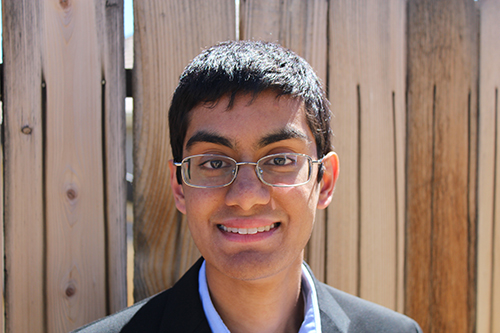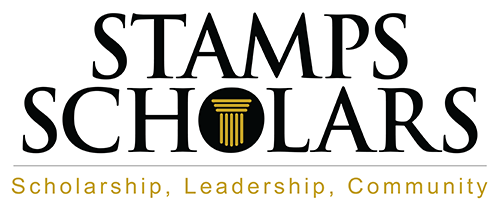Reducing Health Disparities on Both Individual and Community Levels
By Hannah Steinkopf-Frank
 When he was 7 years old, Washington University Stamps Scholar Karthik Rohatgi was shocked to learn that 70% of recipients at his local food pantry were children. That Halloween, he started collecting cans for the pantry instead of asking for candy. “Comparing these children’s food with my dinner was a wake-up call and got me started on a long path of charitable work, eventually leading to the founding of a full-fledged nonprofit project, Farm Fresh For Kids.” FFFK helps low-income, nutritionally at-risk children get started eating more fresh produce while also promoting small-scale farmers. This is accomplished by distributing farmers’ market vouchers and nutrition education through sliding-scale medical and dental clinics.
When he was 7 years old, Washington University Stamps Scholar Karthik Rohatgi was shocked to learn that 70% of recipients at his local food pantry were children. That Halloween, he started collecting cans for the pantry instead of asking for candy. “Comparing these children’s food with my dinner was a wake-up call and got me started on a long path of charitable work, eventually leading to the founding of a full-fledged nonprofit project, Farm Fresh For Kids.” FFFK helps low-income, nutritionally at-risk children get started eating more fresh produce while also promoting small-scale farmers. This is accomplished by distributing farmers’ market vouchers and nutrition education through sliding-scale medical and dental clinics.
After seventh grade, his family moved to Reno, Nevada so he could attend The Davidson Academy of Nevada, a public school on the University of Nevada, Reno campus. “Attending the Academy allowed me to take classes based on my ability — rather than age — and be part of a community of like-minded students where it was cool to talk about math and foreign languages during lunch, rather than play sports.” He also enjoyed courses in statistics, public health, and other fields, which cemented his academic interests at an early age.
He said the Stamps Scholarship made it very easy for him to choose Washington University. “I knew that by accepting the scholarship, I would be part of a community dedicated to excelling in academic pursuits and to learning from great mentors and advisors.”
At the university, his main activity has been public health research related to nutrition. He uses statistical models to study the associations of ultra-processed food consumption with gestational weight gain and newborn clinical outcomes. He continues his involvement with Farm Fresh For Kids as an advisor and treasurer.
In addition, through the Civic Scholars Program, he is working on projects to increase access to healthy food in Northern Nevada and is part of the university’s GlobeMed chapter, through which he helped coordinate global health presentations.
He also plays clarinet in the WU Symphony Orchestra. In his free time, he enjoys cooking different global cuisines, hiking, watching Hindi movies, and reading The Economist magazine and a variety of books.
During his sophomore summer, he used the scholarship enrichment fund to study abroad in Peru, where he stayed with a host family, practicing Spanish 100% of the time, and took courses in public health, traditional medicine, and economic development in the Andean region. He also had the opportunity to meet indigenous healers and practitioners, which for him, put Western biomedicine into perspective as one of many forms of medical care. “After studying Spanish since third grade, my trip to Peru was the first time I was really able to make use of my spoken Spanish outside the classroom. It was also rewarding to be able to develop relationships with other people, including my host mom and a restaurant owner, entirely in another language.”
He also used part of the fund to travel to the National Association of Farmers’ Market Nutrition Programs (NAFMNP) 2016 conference in Juneau, Alaska. He gave a presentation on increasing redemption of farmers’ market vouchers. “Even though I was a “speaker,’ I learned a huge amount from other state FMNP leaders about how I could improve Farm Fresh For Kids.” He will be using the remaining funds to visit Argentina this fall, where he will present his research project at the International Congress of Nutrition.
His goal for his senior year of college is to better understand how he can use his strengths to remain civically engaged throughout his career. He also hopes to publish his research study in a scientific journal and complete a thesis project applying statistical models to data of patients with Alzheimer’s disease. He is currently applying to medical school to start in fall 2018. His plan is to obtain both a medical degree and master’s in public health, as he is interested in working to reduce health disparities on both the individual and population levels.
“The Stamps Scholarship has allowed me to meet a lot of intelligent, dedicated people and have amazing opportunities that I otherwise wouldn’t have had. Also, it has been an enormous boost of confidence to know the entire Stamps Foundation believes in me and to be able to turn to the Foundation and other Scholars and alumni as I progress towards a career in medicine and public health.”
